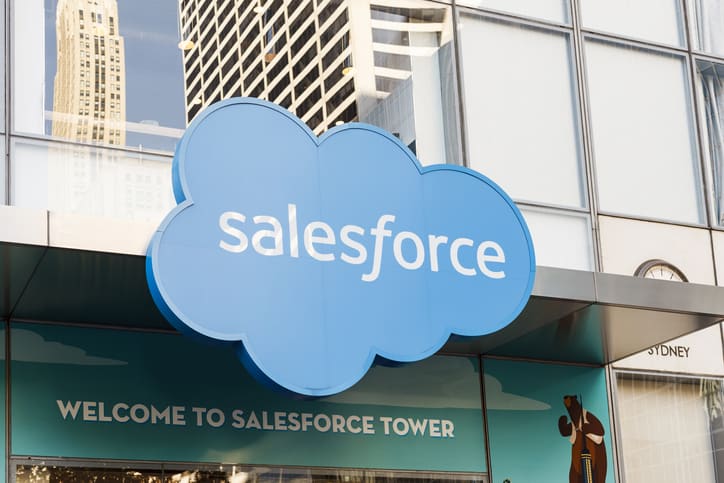Blog
Salesforce Acquires Slack: Salesforce Stands to Gain Much More Than Slack in the Long Run | Blog

There was much excitement on December 1, 2020, when Salesforce announced that it has entered into a definitive agreement to acquire Slack, and Salesforce CEO Marc Benioff called the US$27.7 billion deal a “match made in heaven.” In the days since, however, the market has significantly dampened that excitement, with Salesforce losing more in market valuation than the price it paid for the acquisition.
But we at Everest Group are bullish on the deal; we believe Salesforce has much to gain in the long term.
Microsoft’s erstwhile involvement
Microsoft considered buying Slack for US$8 billion in 2016, but ultimately decided to take this market on organically, releasing Teams within a year. Microsoft used the US$8 billion to invest in Teams growth through:
- An ecosystem play – Microsoft leveraged its Office 365 ecosystem to increase the Teams user base. It effectively provided Teams for free as part of multiple Office 365 packages, providing a more holistic value proposition.
- Aggressive sales – Microsoft started a price war with Slack by offering Teams as a free product or at a highly discounted price. With its deep pockets and bundled offerings, Microsoft effectively contained Slack, turning the market against it, causing its valuation to decline.
Slack’s story
They say necessity is the mother of invention, and Slack is the poster child for that. What began as an internal tool, developed out of necessity turned into a wildly popular chat and productivity offering. Then Microsoft set its sights on the space, effectively crushing Slacks’ growth. In terms of market adoption, before Slack stopped reporting daily active user numbers in 2019, it was able to grow to about 12 million users in seven years; Teams matched that number in only three years. Moreover, Teams continues to expand its presence with a daily active user base touching 115 million in October 2020.
In terms of market valuation, despite achieving robust revenue and user base growth, Slack has not been profitable, reporting a loss of US$138 million in 2019. Additionally, its market valuation has eroded significantly since its IPO listing: From its IPO price of US$38.50, Slack was trading at $25.89 on October 31, 2020, a valuation loss of ~33%.
In many ways, its rivalry with Teams and its ensuing market valuation loss made Slack desperate for an acquisition. Slack needed a partner to sustain itself and compete with Microsoft. Salesforce to the rescue!
How can Salesforce help Slack compete with Teams and Zoom?
One’s immediate reaction may be that Slack should be able to arrest its slide given its ability to reach into Salesforce’s deep pockets. However, our take is that Salesforce is good at selling to business units and sales and marketing folks, not to enterprise IT and tech, who would be the primary Slack buyers. That is Microsoft’s power alley – the area it rules. In addition to money, Salesforce will have to make big changes to its sales model to make a dent in Microsoft’s tight control of that space.
How does Salesforce benefit from this acquisition?
The acquisition comes at a time when Salesforce recognizes its need to build integrated suites for enterprises. Most of its competitors – Microsoft, of course, and SAP and Oracle – have been talking about integrating the front and back ends, especially as enterprises have started to realize the importance of end-to-end integrated suites cutting across ERP, CRM, and HCM.
This acquisition gives Salesforce the opportunity to move beyond the sales and marketing area and gain access to other parts of the organization. If integrated well with the Salesforce platform, Slack could potentially act as a unifying thread across ERP, CRM, and HCM, while also solving for the missing piece in their customer-360 value proposition.
Salesforce has made a couple of failed forays in the collaboration space with Chatter and Quip; the third time may be the charm with Slack, given its more robust offering and positive customer sentiment.
What does the acquisition mean for the market?
The acquisition highlights the fact that the industry is going through consolidation, and standalone products are finding it difficult to compete with larger players that offer bundled products. Moreover, the collaboration space is gaining significant traction among enterprises as remote working becomes the new norm. We wouldn’t be surprised to see Amazon or SAP getting into this space, and we’re wondering if we might see Atlassian, Splunk, or some other similar organizations in the acquisition news sometime soon.
If you’d like to share your thoughts on the acquisition or on Salesforce’s strategy, reach out to us at [email protected] or [email protected].